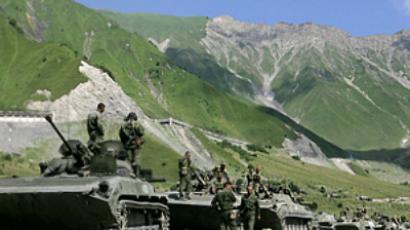S. Ossetia still healing scars of war
Russia’s military has warned Georgia against trying to repeat last year’s assault on South Ossetia, saying such actions will be met with an adequate response.
General Anatoly Nogovitsyn, the deputy chief of the General Staff of Russia’s Armed Forces, says that, at the moment, Georgia is not capable of launching a successful offensive against the republic.
According to him, Moscow does not currently see any other threats from Tbilisi “other than provocations”.
However, Nogovitsyn said he does not exclude the possibility of a full-scale attack in the future.
“Georgia is rearming itself at an alarming pace. If Tbilisi continues to increase its military potential, the balance of forces in the region may change.”
He stressed that Moscow is not planning to deploy additional troops to the region any time soon.
“There was a conflict and we have done what we had to do, but now we have other goals, such as avoiding the repetition of last year’s events.”
Amid fears that weapons continue to enter Georgia, Russia has again criticized neighboring Ukraine for its role in supplying arms last year during the South Ossetian conflict. It follows a UN report on global weapons supplies which outlined the extent to which Ukrainian weapons were shipped.
But Kiev says it was acting within UN regulations. Russia's deputy foreign minister, Grigory Karasin, says this comes as little surprise.
“We know it for sure that Ukraine supplied military equipment to Georgia," Karasin said. "This information has been partly confirmed by Ukrainian MPs. But we hope that Ukraine, as a neighboring country, will stop its military cooperation with Georgia as it could result in colder relations with Russia.”
Russian troops located in South Ossetia have been put on high alert, following alleged provocations by Georgian troops.
Speaking about the recognition of Abkhazia and South Ossetia, which followed shortly after the assault, Russia’s Foreign Minister Sergey Lavrov said this step was unprepared.
“From time to time, though less than before, we can hear claims that Russia is to recognize the territorial integrity of Georgia, and withdraw its troops from Georgian territory – meaning South Ossetia and Abkhazia. This is the faint echo of the old way of thinking, claims of those who, despite the accepted realities, try by all means to get us involved, to get us irritated. And, of course they are trying to rescue the regime, which is a failure,” Lavrov said. “Our recognition of South Ossetia and Abkhazia was an unprepared step. In the first place we thought of saving people’s lives. But then, we saw that to save those people was not enough to stop the aggression and leave them on Georgian territory. If they had stayed in Georgia with such a president, these two republics would have suffered more.”
Watch full version of the interview with Russia's Foreign Minister Sergey Lavrov
Meanwhile, local residents are still struggling to get back to a normal life after last year’s conflict.
Irina Parastayeva’s apartment block was among the first along the route the Georgian tanks took as they rolled into Tskhinval last August. Along with her daughter she spent three days sheltering in a basement with little to do but count the shots fired at the floors above, wondering if she’d live to tell the tale.
A year later, looking at the burnt out ruins of her flat, Irina knows only too well her life is still far from normal.
“The authorities have not started to restore the houses yet. But it probably takes longer than a year to do that, but they do promise that all the buildings will be restored. But I think a house is a fair price to pay for independence anyway,” Irina said.
According to South Ossetian authorities, nearly 70% of Tskhinval’s buildings were either damaged or destroyed in the fighting, leaving many families without homes. Even now, most of them still have no permanent roof over their head.
Given the scale of the devastation, rebuilding the essential infrastructure had to come first. It was only until several months ago that real reconstruction could begin.
“Preparations such as producing raw materials took a long time. But now we are starting to really restore the city. Electricity and gas have already been restored. The water supply will be fully restored soon,” commented Zurab Kabisov, head of the South Ossetian restoration committee.
Russia has allocated around $300 million in financial aid to help South Ossetia recover from Georgian aggression. Officials promise that, by next winter, Tskhinval will have a whole new look.
Many refugees from previous conflicts are now returning to the republic following Russia’s recognition of its independence from Georgia.
However, despite the efforts of the authorities and the citizens, it is clear there is still a long way to go.
Read also Saakashvili's Georgia and swine flu equally dangerous













